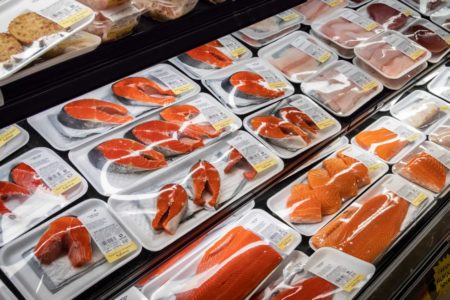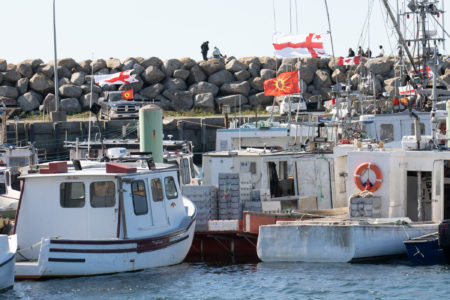
For years, the ‘Namgis and Musgamagw Dzawada’enuxw have been fighting controversial open-net fish farms in their territorial waters, in the Broughton archipelago near the northern end of Vancouver Island. They argue that farmed salmon pass on illnesses to their wild cousins and have contributed to the collapse of BC’s wild salmon runs.
Recently, several fish farm licences in their territory were up for renewal. Many people were expecting the province to refuse to renew them. Instead, BC has entered into nation-to-nation negotiations in the Broughton. It also announced more broadly that fish farms will require Indigenous consent in order to operate anywhere in the province, but that the new requirements won’t take effect for another four years. In the meantime, licences will be renewed as they expire, prolonging the risk to wild salmon.
The announcement caught many by surprise. There has been a great deal of backlash against the decision to protect fish farms for another four years, and rightly so. However, the province’s move toward Indigenous consent is significant and complex in its own right. The decision could represent an important shift in the political landscape, and it also raises a host of new questions about what exactly “consent” will look like.
Consent in context
To understand the importance of BC’s announcement, we need to put “consent” in a political context.
For decades, consent has been nothing but a buzzword — empty rhetoric. Courts have required governments to consult Indigenous peoples, but this requirement almost always falls short of actually obtaining their consent. As a result, governments tend to “consult” First Nations, then do whatever they want, regardless of Indigenous objections.
This is also true of the United Nations Declaration on the Rights of Indigenous Peoples (UNDRIP), which the Trudeau government has recently embraced. It places a great deal of emphasis on the concept of consent. However, the declaration’s final language requires only that the government “consult and cooperate in good faith” in order to obtain consent — it doesn’t seem to actually require that consent be obtained. Once again, governments are using the word “consent” to pay lip service to Indigenous sovereignty without actually needing to respect Indigenous decisions. To illustrate the point, the government supported legislation on UNDRIP at the very same time when it bought the Kinder Morgan pipeline, over strong Indigenous objections.
Arguably, this questionable approach to consent stretches back at least as far as the Confederation-era treaties, where “consent” was often coerced, invented or fraudulently obtained to give government actions the veneer of legality.

In this context, there is every reason to be cautious and critical about BC’s recent pivot to consent. However, so far, the province’s announcement on fish farm tenures doesn’t appear to hedge the way that other instruments do. It appears to actually require consent. If this proves true, it would transform consent from a smoke-and-mirrors trick designed to mask ongoing colonialism into a real recognition of Indigenous decision-making authority.
If the province is genuine, its move toward consent could be far more significant than the alternative course it might have pursued by simply cancelling licences. While the decision prolongs the life of some fish farm operations, it could also begin to shift long-standing colonial power dynamics and patterns of thought, patterns that are inseparably related to ecological destruction. Ultimately, these shifts have the potential to begin to challenge the larger power structures and ways of thought that put salmon at risk in the first place.
Consent culture?
This move toward consent is even more significant because it creates a model for other policy areas. If Indigenous consent is necessary for fish farms, why not for commercial fishing? Logging? Liquefied natural gas? Pipelines? Government services? If the inherent rights of Indigenous peoples are relevant to aquaculture, it’s hard to imagine why the same wouldn’t be true elsewhere as well. The slippery slope here is obvious.
The announcement also puts the federal government in an awkward position. Now that the bar has been set by BC, it will be difficult for Ottawa to justify a lower standard. It is even possible that courts will fasten onto the new standard when they assess consultations in the future.
In fact, Canada is a well-studied model for other settler colonies like New Zealand, Australia and the US. If consent takes hold here, BC’s initiative may help sow seeds of change around the world. Slippery slopes indeed.
The province should take advantage of this situation, working with Indigenous peoples to develop a comprehensive approach to consent that can be adopted more generally. However, consent is not always as self-explanatory as it seems, and the details matter.
Whose consent?
For example, BC says it will renew permits only if agreements between fish farm operators and First Nations are already in place. This suggests that corporations, rather than governments, will be the ones securing consent. This is increasingly common practice, yet it stands in contrast to several hundred years of British and Canadian policy, under which only the government negotiated with First Nations. It also sits in tension with the 2004 Haida decision, in which the Supreme Court of Canada held that governments cannot delegate the substance of their duty to consult First Nations to private parties.
Are First Nations better off negotiating with governments than with corporations? It’s hard to say. Conceptually, the lack of “government-to-government” negotiations could be seen as undermining the national status of First Nations. However, First Nations may also find corporate partners receptive to ideas where governments are not. Dealing with them directly may offer some real advantages.
If consent is to be thorough and meaningful, First Nations themselves should be able to choose whether they would rather deal with the province on a government-to-government basis, or deal with a corporation directly. If the idea is to obtain consent, surely this includes consenting to the structure of the negotiations themselves.
A related issue involves whose consent is actually required within each community. Will consent be given by Indian Act-created band councils? By traditional and hereditary leaders? By some combination of both? By community referendum? Will confederated or regional bodies play a role? Equally important, who will get to decide: the nation or the provincial government? Colonial authorities have a long history of choosing which leaders to recognize based on which leaders are most agreeable to government ends. If consent is to be meaningful, First Nations must determine the form of negotiation through their own community protocols.
Whatever the internal processes of each community, there are also sure to be cases where traditional territories overlap or their boundaries are contested. How will the province determine which groups should be consulted? Or will this too be left to corporations? Once again, the government would be wise to leave the negotiation of these issues to First Nations themselves.
All of these questions illustrate that there are levels to the concept of consent: consent to the operation of a fish farm, and consent to procedures by which consent is granted. If the former is to be meaningful, the latter must be very carefully attended to.
Consent and resources
One important factor in these negotiations stays the same, whether First Nations negotiate with governments or with corporations. In either case, First Nations face a resource imbalance. Marine Harvest and Cermaq, two major fish farm operators, have combined annual revenues of $14 billion. At $20 million, the ‘Namgis Nation’s annual revenues are less than 0.015 percent of those of their corporate counterparts. When it comes to bearing the expenses of a complex, prolonged negotiation, the imbalance is obvious.
One can also raise serious questions about how “freely” consent is given when money is offered to a community that has been systematically impoverished and dispossessed by deliberate government policies. Indeed, several First Nations have recently announced their opposition to the Kinder Morgan pipeline despite having signed agreements with the company, arguing that government-induced financial need had forced them to stand behind a project they would otherwise oppose.
In order for consent to be free and fair, the province should cover the costs of negotiations. More importantly, it should take broader steps toward long-term resource sharing, revenue sharing and reparations in order to ensure that no nation negotiates from a position of government-induced desperation. To be meaningful, consent must be part of a much broader commitment to wealth redistribution.
Consent and timing
Many activists rightly decry BC’s decision to delay the consent requirement for four more years. Chief Bob Chamberlin, vice-president of the BC Union of Indian Chiefs, says four more years is four years too late for wild salmon. When it comes to respecting Indigenous sovereignty on the West Coast, it’s closer to 204 years too late.
The government will surely claim that industry needs time to adjust, that sudden action would expose taxpayers to costly lawsuits or that negotiations will take time and ought not to be rushed.
Once again, the government would do well to note the Supreme Court’s reasoning in Haida. Here, the Court held that logging could not continue indiscriminately where an unproven title claim might exist. Otherwise, the Haida might be left with title to a bunch of stumps, and nothing more. Similarly, one could argue that allowing fish stocks to collapse while consent mechanisms are being developed renders that consent meaningless.
To make its move toward consent meaningful, BC should reverse its decision to renew fish farm licences unilaterally for the next four years. As each licence expires, the government should require Indigenous consent before renewing it.
Moving forward
The province’s move toward a consent-based framework is potentially significant and could bring about a wider and more meaningful shift in the political and ecological landscape than cancelling licences ever could have.
This movement is the result of over a century of sustained, Indigenous-led activism. The salmon warriors of the Broughton archipelago and their allies are reshaping the way we think and the way we make decisions, and their accomplishments deserve to be recognized and celebrated.
However, there are also crucial questions as to what exactly consent will look like. How these questions are resolved will determine just how meaningful consent is, and to what extent it will work to challenge the broader power dynamics and modes of thought that drive colonialism, resource extraction and community disempowerment.
To make the most of this historic moment, the BC government, First Nations and activists alike should seek a process that gives First Nations real control not just over aquaculture but over the broader terms of the relationship, and that embeds the giving of consent in a larger reconciliatory and redistributive context.
First Nations and activists have signalled that the battle over fish farms is far from over. It seems that the age-old fight for consent, too, is just getting started.
Photo: Protesters stand outside the Fisheries and Oceans office in downtown Vancouver on August, 23, 2017 to rally against fish farms and to bring attention to the protection of the salmon population. THE CANADIAN PRESS/Jonathan Hayward
Do you have something to say about the article you just read? Be part of the Policy Options discussion, and send in your own submission. Here is a link on how to do it. | Souhaitez-vous réagir à cet article ? Joignez-vous aux débats d’Options politiques et soumettez-nous votre texte en suivant ces directives.








